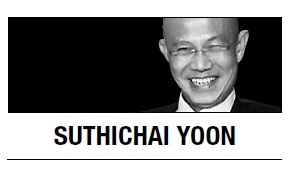
“I think my successor as central governor will have to have an engineering or computer science degree to cope with this new global trend.”
The suggestion was that an economics degree is probably no longer enough for financial and monetary regulators to cope with the coming disruption caused by the onrush of fintech, which threatens to sideswipe the unprepared.
Thai central and commercial bankers alike are caught in a new dilemma over how (not whether) to embrace this new technological innovation that has quickly become the 21st-century way of trading and banking.
One banker talked about the mobile-only stock-trading app Robinhood, which charges no fee for trades. Also challenging traditional stock trading models is the emergence of local start-ups.
A senior central banker said that at least nine applications for licenses to conduct peer-to-peer lending had been submitted to the Bank of Thailand.
“We have been going around the commercial banks and asking them the tough question: Where will your revenue come from in the near future if new financial technology starts taking away income from our traditional services? Not every bank has an answer yet. But they are well aware of the threat they are facing,” the Thai central banker said.
A top Thai banker, asked about the innovation, admitted: “Yes, fintech can offer lending services more efficiently and economically, but the risk is also high. Who’s going to regulate it?”
Thai central bankers say they believe they can handle the new technology — up to a point. That’s why regulations in this regard are being revised to create the flexibility needed to cope with the rapid and unpredictable changes.
“I have to tell the staff at the central bank that they have to understand how to manage change and adapt accordingly or else we will be left behind. Some of them still think digital banking needs a separate license, while I say that digital banking is just an offshoot of main banking activity. So it doesn’t require a new license,” the central banker said, explaining that even central bankers have been forced to adjust their mode of thinking to fit the new phenomenon.
Commercial bankers are looking on in awe as they see peer-to-peer lending sites like Prosper and Lending Club promise to reduce rates by opening up competition for loans to broaden market forces.
Also being developed are innovative tools like mobile banking, mobile trading on commodities exchanges and digital wallets such as Apple’s AAPL and Google’s GOOG. Meanwhile Learn Vest and Betterment are financial advisory and robo-adviser sites that promise to sideline traditional commercial banking in a big way.
It won’t be long before all-in-one money management tools such as Mint and Level revolutionize the way citizens handle money by eradicating the need to ever visit a bank.
A recent round of discussions with tech gurus in Bangkok has convinced me that new technologies such as “machine learning,” “predictive behavioral analytics” and “data-driven marketing” will replace the current practice of banking — and ordinary people will reach financial decisions without guesswork, tricks or gimmicks.
A typical “P-to-P” online service matches the prospective borrowers with investors ready to lend. “We have cases of a service that allows SMEs to present their cases for loans. Investors interested in providing the loan then pitch in. Money is put in an escrow account. Once relevant terms including interest rates are agreed upon, a deal is signed and the money is transferred,” explained the central banker, who is overseeing the local transition to fintech.
“Thai commercial banks are moving in this direction at varying speeds, of course. Some banks have adopted the policy of setting up their own digital units to back up their traditional role. Others turn themselves into capital ventures, buying up start-ups that fit their strategy,” she explained.
Things will remain confusing, uncertain and unpredictable for the next years or so. Perhaps, as befits the nature of all things digital, the dust will never settle long enough to give people time to make proper adjustments. The cycle of new innovation is moving with such dizzying speed that you need to sprint just to stay in the same position.
Another central banker had a self-deprecating take on new tech’s potential impact: “One consolation is that if fintech replaces commercial banking as we know it today, then central bankers won’t have to worry too much. There won’t be any commercial banks left to regulate anyway!”
By Suthichai Yoon
Suthichai Yoon is chairman of the Nation Multimedia Group in Thailand. — Ed.
(The Nation/Asia News Network)








![[Weekender] Korea's traditional sauce culture gains global recognition](http://res.heraldm.com/phpwas/restmb_idxmake.php?idx=644&simg=/content/image/2024/11/21/20241121050153_0.jpg)